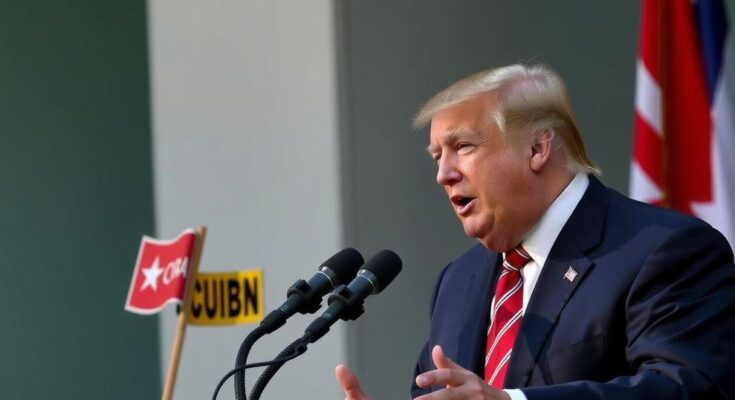Cuba’s President Miguel Diaz-Canel has expressed that the nation is prepared for the challenges likely posed by President-elect Donald Trump’s administration following the recent election. He highlighted Cuba’s openness to dialogue with the US government, while firmly opposing any foreign intervention. The president criticized the longstanding sanctions as detrimental to the Cuban economy, exacerbating the current crisis, characterized by shortages and public discontent.
Cuba’s President Miguel Diaz-Canel asserted that the country is well-equipped to face potentially harsher conditions under President-elect Donald Trump, following his election on November 5. This statement marks Diaz-Canel’s initial response as he acknowledged the longstanding US sanctions that have severely impacted the Cuban economy. He emphasized Cuba’s readiness to engage in dialogue with the Trump administration while underlining the nation’s stance against foreign interference.
During his previous term, President Trump reinstated restrictive policies against Cuba, rolling back the detente period initiated by Barack Obama. Diaz-Canel criticized the sanctions, labeling them as “genocidal,” and remarked on the economic challenges Cuba faces, which include shortages of essential resources. He expressed that the election outcome was anticipated and prepared for, insisting on an equal dialogue with the US government regarding their differences.
The sanctions, enacted since 1962, have contributed to a significant economic crisis in Cuba, characterized by shortages of fuel, food, and medications. This has fueled unprecedented anti-government protests, with many individuals imprisoned following the protests in July 2021. Analysts further attribute the ongoing crisis to mismanagement by the Cuban government and the adverse effects of the Covid-19 pandemic on tourism, a vital economic sector.
In summary, Diaz-Canel’s comments reflect Cuba’s resignation towards the upcoming challenges and their ongoing openness to negotiations, marking the new era under a potentially more adversarial US administration.
The relationship between Cuba and the United States has been tumultuous for over six decades, primarily influenced by US sanctions and Cuba’s communist government. In 1962, the US implemented an economic embargo to counter perceived threats from Cuba, leading to an ongoing state of crisis within the island’s economy. The Obama administration’s attempts at normalizing relations were met with resistance during Trump’s presidency, which reinstated many restrictive measures. President Miguel Diaz-Canel’s leadership continues to grapple with these challenges, emphasizing the sanctions’ detrimental effects on Cuban society.
In conclusion, President Miguel Diaz-Canel’s comments indicate Cuba’s readiness to confront challenging circumstances under a second Trump administration. His emphasis on dialogue demonstrates a willingness to engage constructively, yet he firmly rejects any form of foreign interference. As Cuba navigates this complex relationship, the impact of longstanding US sanctions remains a significant factor, compelling the leadership to address the resulting economic hardships and societal unrest perceived by many in the nation.
Original Source: www.jamaicaobserver.com




